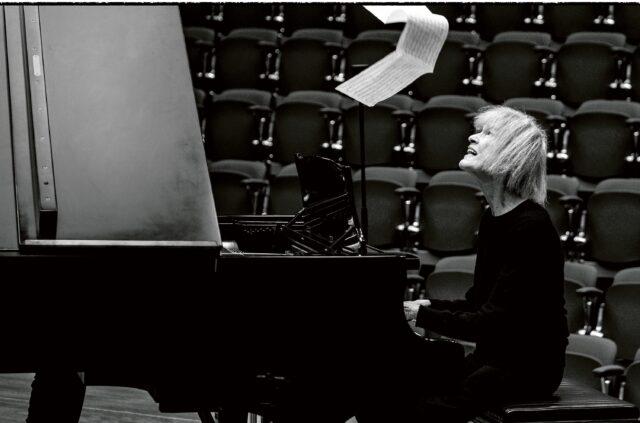Carla Bley 1936~2023 ECM
Our good friend Carla Bley has died, aged 87, after a long illness. One of jazz’s great composers, she was a stubborn and witty individualist who heard and wrote and played things differently. “She works in many forms,” critic Nat Hentoff noted, “and her scores for big jazz bands are matched only by those of Duke Ellington and Charles Mingus for yearning lyricism, explosive exultation and other expressions of the human condition.” The large ensembles, remarkable as they were, were but part of the story.
The originality of Carla’s writing was evident already in the early 1960s as musicians including Jimmy Giuffre, Paul Bley, Art Farmer, and George Russell began to play her pieces. Many of the tunes she wrote then have acquired the status of contemporary standards, among them “Jesus Maria”. “Ictus”, “Sing Me Softly of the Blues”, “King Korn”, “Vashkar”, and more. “There are so many of them, each as well-crafted as pieces by Satie or Mompou—or Thelonious Monk for that matter,” as Manfred Eicher has observed. “Carla belongs in that tradition of radical originality.”
The Jazz Composer’s Orchestra, of which Carla was a founder member, recorded her epic Escalator Over The Hill,described by down beat as “a masterpiece…maybe the most extensive and ambitious piece ever to come out of the jazz world.” In 1973 Carla and Michael Mantler launched the WATT label which would be the primary platform for her work in the 20th century, with formats ranging from duos with Steve Swallow to Very Big Band and idioms including Fancy Chamber Music, Christmas music, Dinner Music, and the Dada-esque I Hate To Sing. Her arrangements for Charlie Haden’s Liberation Music Orchestra graced The Ballad of the Fallen, a 1982 ECM session with luminous settings of songs associated the Spanish Civil War and with revolutionary movements in El Salvador, Chile and Portugal.
Carla Bley’s last albums were the ECM recordings made at Lugano’s Auditorio RSI with the exceptional group with Andy Sheppard and Steve Swallow: Trios,Andando el Tiempo, and Life Goes On. As well as the group interaction, each of the recordings also emphasized the unique qualities of Bley’s pianism. Carla’s relationship with the instrument she had played since the age of four was sometimes troubled. “I would rather write music than perform it,“ she would often insist. “I’m at a disadvantage when I improvise since jazz solos are instant composition and I’m a slow and thoughtful composer. By the time I’ve thought of the next note, the chorus could easily be over.” Her admirers – count us in – waved away such protests. Any hesitations in the determined search for the good notes only added a touch of drama and Zen allure to the playing.
In later years, Carla herself seemed to be reframing her reservations: “There’s nobody that plays like me — why would they?”, she asked The New York Times. “So if I’ve had an influence, maybe it would be if they decided to play like themselves. In other words, the whole idea of not playing like anybody else is a way of playing.”
She will be sorely missed.
私たちの親友カーラ・ブレイが長い闘病生活の末、87歳で亡くなった。ジャズの優れた作曲家のひとりである彼女は、一本気かつ機知に富んだ個性派で、人とは違うものを聴き、書き、演奏した。批評家のナット・ヘントフによれば、「彼女の演奏形態は多岐にわたり、例えば、ジャズのビッグバンドのための彼女の作品は、デューク・エリントンやチャールズ・ミンガスの作品に匹敵するほど、憧れの叙情性、爆発的な高揚感、その他人間の生き様の表現に優れている。 大編成のアンサンブルは注目に値するが、それも物語の一部に過ぎない。
ジミー・ジュフリー、ポール・ブレイ、アート・ファーマー、ジョージ・ラッセルなどのミュージシャンが彼女の作品を演奏し始めた1960年代初頭には、すでにカーラの作曲の独創性は明らかだった。当時彼女が書いた曲の多く、とりわけ、〈Jesus Maria〉〈Ictus〉〈Sing Me Softly of the Blues〉〈King Korn〉〈Vashkar〉など、現代のスタンダードの地位を獲得していた。マンフレート・アイヒャーは、「サティやモンポウ、あるいはセロニアス・モンクの作品と同じくらいよく練られた作品がたくさんある。カーラの作品は、そのような極めて斬新な独創性の伝統に由来するものである」と喝破している。
カーラが創設メンバーのひとりであった「The Jazz Composer’s Orchestra」は、彼女の大作『Escalator Over The Hill』を録音し、Down Beat誌は 「傑作…ジャズ界から生まれた中で最も広範で野心的な作品かもしれない 」と評した。1973年、カーラはマイケル・マントラーとともにWATTレーベルを立ち上げたが、スティーヴ・スワロウとのデュオから『Very Big Band』まで、また『Fancy Chamber Music』、『Chrisymas Music』、『Dinner Music』、ダダ風の『I Hate To Sing』など、幅広いフォーマットで20世紀における彼女の作品の主要なプラットフォームとなった。 チャーリー・ヘイデンの「Liberation Music Orchestra」のための編曲は、スペイン内戦やエルサルバドル、チリ、ポルトガルの革命運動に関連した楽曲を輝かしくセッティングした1982年のECMセッション『The Ballad of the Fallen』を飾った。
カーラ・ブレイの最後のアルバムは、スイス・ルガーノのオーディトリオRSIで、アンディ・シェパード、スティーヴ・スワロウとの特別なトリオで録音したECM盤である: 『Trios, Andando el Tiempo』と『Life Goes On』の2作。どちらの録音もグループの相互作用だけでなく、ブレイのピアニズムの強烈にユニークな特質を感得することができる。4歳から弾いていた楽器とカーラの関係は、時に悩みの種だった。「演奏するよりも曲を書きたいの」と彼女はしばしば主張した。「ジャズのソロは即興で作曲するものだから、即興で演奏するのは不利だし、私はじっくり考えて作曲するタイプなの。次の音を思いついたときには、コーラスが終わっていることもあるの」。彼女の崇拝者たちは〜私たちも含めて〜そんな抗議に耳を貸したことはなかった。なぜって良い音を探し求めて逡巡することは、演奏にドラマと禅の魅力を加えることを知っているから。
後年、カーラ自身は、もう遠慮は無用と思い始めているようだった。: 「私のような演奏をする人は誰もいないわ」NYタイムスの質問に答えて曰く、「だから、もし私が影響を与えたとしたら、それは彼らが自分自身のように演奏することを決めた場合かもしれないわね。つまり、他の誰とも同じようには演奏しないという考え方が、演奏の方法ということなのね」。彼女の旅立ちは惜しまれてあまりあるだろう。
(文責:本誌編集長 稲岡邦彌)

